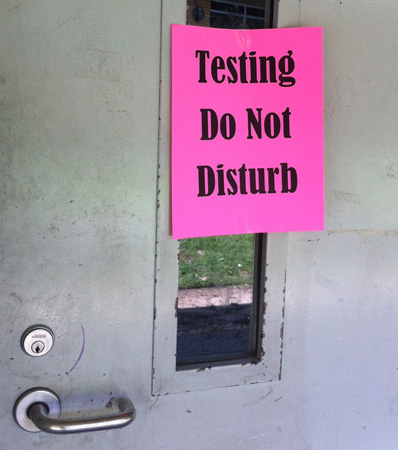Please Write Your State Representative about HB 775!
If you haven’t yet written your N.C. House representative to express your concerns with high-stakes testing and request that he or she support HB 775 – Moratorium on High-Stakes Testing, please do so as soon as possible.
Here’s the letter MecklenburgACTS co-chair Pamela Grundy sent to the members of the House Education Committee today. Yours doesn’t need to be nearly this long. But stories about personal experiences with high-stakes testing will make an impact. For information about locating and contacting your representative, go to the CONTACT Representatives button at the top of this page.
Dear Representative,
On behalf of many, many North Carolina parents, I write to ask you to support HB 775, which would impose a one-year moratorium on state-mandated consequences tied to standardized test scores here in North Carolina. This would be a first step in dealing with the high-stakes testing madness that has done so much damage to education in our state.
As the mother of a sixth grader who has spent his whole career in North Carolina schools, I have seen that damage first hand.
Four summers ago, just before school began, my son came to talk to me.
“I’m nervous about third grade,” he confided.
I was a bit surprised, but recovered quickly and donned my everything-will-be-all-right mom hat. Third grade would be great, I reassured him. He loved his school. He’d been assigned a marvelous teacher, funny and warm and super-sharp. His friends would all be back. He didn’t have anything to worry about.
He quickly set me straight.
“I’m nervous about the EOGs.”
My son was no fool.
For three years he had cheered on anxious test-takers at the school’s annual EOG pep rallies.
For three years he had walked softly past classrooms where silent students bent over bubble sheets.
For three years he had seen the signs. “Closed for Testing.” “Testing in Progress.” “Quiet: Testing.”
He knew how much the tests mattered.
He knew this year he would be the one clutching the yellow pencil, with not only his own fate, but that of his teachers and his school weighing on his nine-year-old shoulders.
And my beautiful, bright son, who already bore the official stamp of “academically gifted,” was worried before he even started school.
Third grade was not an easy year. My son’s teacher, who had been working with children for more than thirty years, didn’t think third graders were old enough for this kind of testing. But it was her job to prepare them, and she gave it all she had.
She taught them all the tricks – how to cross off the obviously wrong choices, when to guess. At home, we completed worksheet after practice worksheet – on top of the reading and projects that were the regular class assignments. She was a fantastically skilled teacher, regaling the class with a style and flair and humor that made the whole thing as bearable as possible. But still, anxieties rose.
I remember that the pollen was bad that spring, and the room filled with sniffs and sneezes. They ran out of tissues, and resorted to passing a roll of toilet paper from desk to desk, students tearing off sheets as needed. It felt like nature was conspiring to make the test-prep time as miserable as possible, in some fiendish trial of character. We did our best to just keep slogging forward.
Then test week came and went.
When the tests were done, so was my son. He had done his job. He had passed both tests, made his contribution to the school’s all-important final numbers. His teacher, to her credit, kept on teaching, moving to new subjects, assigning new projects. But he refused to do another lick of work. Threats, encouragement, even bribes all failed. He ended the year with the worst grades he’d ever gotten.
This was not a valuable learning experience. It did not toughen up my son and make him eager for the next challenge. The math test was all right. The literacy test – the area where he excels – was awful: piece after poorly-written piece of manufactured writing, followed by cramped, dull questions (for an example of this kind of test, you might review last year’s Pineapplegate scandal).
By the end he knew – without my telling him – that the tests on which so much energy had been expended gave him no opportunity to demonstrate the most important things his teacher taught him – the thorny questions the class pondered, the multi-media projects they crafted, the way they learned to express themselves with vivid, graceful language. The “3” he got in math was simply a relief, and the “4” in literacy was not really worth celebrating.
In short: his anxiety turned into cynicism. And I could not tell him he was wrong. I don’t have a problem with tests in general, and we’re hard on him about keeping up his grades. But these high-stakes tests are different. I just keep explaining that there are some things you’re simply required to do, and that even when they don’t make sense you should still do the best you can. That’s just the way life is sometimes. I suppose that is some kind of lesson, but it’s not one I enjoy repeating.
I want to emphasize that my son is lucky here. He has never failed one of these tests, never had to worry that it would hold him back a grade, or mark him as a “failure.” He has been in classes where his teachers have been confident enough to put some limits on both test prep and anxiety. But it has harmed his education all the same.
Now here’s where you come in. I want my son to learn a different lesson from this high-stakes testing mess. I want him to learn that when citizens see that something has gone terribly wrong in our society, they can band together and stop it, using the power of democracy and of representative government.
By listening to us, and by supporting this and other measures that reduce high-stakes testing, you can help teach this lesson to students across the state. Please join us.
Sincerely,
Pamela Grundy
Charlotte, N.C.


